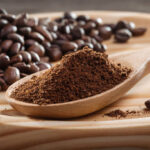Curious to know if Thai tea has caffeine? We’ve all been there: the sweet smell of a chai latte teases our nose in a cafe or maybe you’re browsing the shelves at your local grocery store, eyeing up different types of tea. We know that regular black and green tea contain caffeine, so does Thai tea have caffeine? The answer may surprise you. In this blog post, we’ll take an in-depth look into what makes Thai tea special and answer your burning question about its caffeine content. Keep reading to find out more.
Contents
What is Thai tea?
Thai tea is a sweet, fragrant beverage made from Ceylon black tea with added spices and other flavorings. Generally, it has a bright orange hue that comes from adding food coloring to the final product. It’s often served over ice with condensed milk for an extra sweetness factor. Thai tea can range in strength, depending on how it’s brewed and how much tea is used in the blend.
Composition of Thai Tea
The base ingredient of Thai tea is black tea produced in Thailand’s mountainous northern regions. Thai black teas are processed similarly to standard black teas but feature an intensified flavor and aroma. Common Thai tea blends combine black tea leaves with spices like star anise, cardamom, tamarind, and orange blossom. The tea is brewed strong, mixed with milk and sweetened with sugar. Traditional Thai tea has a creamy orange color from the interaction between the tannins in black tea and the dairy. Key traits of Thai tea’s taste profile are its robust, malty black tea flavor, hints of anise and spices, and a sweet, creamy texture.
Some basic components of Thai tea include:
- Black tea leaves – Grown in northern Thailand, processed into strongly flavored black tea.
- Star anise – Provides licorice-like sweetness.
- Cardamom – Imparts a touch of spice and fruitiness.
- Tamarind – Adds a subtle tartness and fruity undertone.
- Orange blossom water – Lends a refreshing, citrusy aroma.
- Milk – Usually sweetened condensed or evaporated milk. Gives a creamy, sweet background.
- Sugar – Vital for the drink’s signature sweetness. White or cane sugar is typically used.
- Food coloring – Creates the reddish-orange hue. Often red-orange artificial dye.
This combination of tea leaves and warm spices like anise, cardamom, and tamarind is integral to Thai tea’s iconic flavor. The milk provides a creamy backdrop that balances the strong tea while the sugar lends the sweetness Thai tea is loved for. Food coloring gives the beverage its reddish tint but does not impact the taste.
Nutritional Profile of Thai Tea
The nutritional value of Thai tea can vary based on the specific ingredients and quantities used. However, some generalizations can be made about its nutritional makeup:
Macronutrients:
- Carbohydrates – Primarily derived from added sugar. A 12oz serving may contain 45-60g total carbs.
- Protein – Mainly obtained from the milk. Around 5-8g per 12oz serving.
- Fat – Also derived from milk. Approximately 5-12g per 12oz serving.
Micronutrients:
- Caffeine – From black tea. Roughly 35-45mg per 12oz serving.
- Theobromine – Additional stimulant found in tea. About 10-25mg per serving.
- Antioxidants – Abundant polyphenols and catechins from tea. Particularly epigallocatechin gallate (EGCG).
- Vitamin C – Small amounts from citrus ingredients like orange blossom water.
- Potassium, magnesium, calcium – Trace amounts from tea and milk.
As shown above, the predominant macronutrients in Thai tea are carbohydrates from added sugar and minimal protein and fat from the dairy. It also contains immune-supporting antioxidants from tea as well as caffeine for an energizing effect. But overall, Thai tea’s nutritional value largely depends on the milk and sugar quantities.
Caffeine Content in Thai Tea
Thai tea does contain caffeine, which is a naturally occurring stimulant found in tea leaves. The caffeine content in Thai tea can vary depending on factors like the type of tea leaves used and how the beverage is prepared. For example, Thai tea bags have an estimated caffeine concentration of 218 mg/L. Caffeine is known to have both positive effects, such as improving performance, and negative effects like sleeplessness and anxiety. Additionally, Thai tea, like black tea, is rich in antioxidants and polyphenols that offer various health benefits, including anti-inflammatory potential and weight loss support. It is important to note that Thai tea is a popular beverage known for its unique flavor profile, often enjoyed with added sugar and spices like cardamom and star anise.
Potential Health Benefits of Thai Tea
Regularly drinking Thai tea in moderation may offer certain health benefits:
Energizing Effects
The caffeine and theobromine in Thai tea provide a temporary energizing effect by blocking sleep-inducing adenosine receptors in the brain. This can enhance alertness and focus when consumed in moderate amounts.
Antioxidants
Black tea is abundant in antioxidant polyphenols like flavonoids and catechins that may help reduce oxidative stress and inflammation in the body. These include compounds like epigallocatechin gallate (EGCG).
Immune Support
The antioxidants in Thai tea have been shown to potentially boost immune cell activity. These antioxidants could help fight infections and prevent illness.
Heart Health
Some research indicates the polyphenols in black tea can improve cardiovascular health by reducing LDL cholesterol oxidation and blood pressure. But added milk and sugar offset these benefits.
Digestion
Ginger and other spices in Thai tea may aid digestion by reducing gas, bloating, and stomach discomfort after eating.
So the antioxidant compounds from black tea and spices present some advantages related to energy, immunity, and digestion. However, the high amounts of added sugar and milk reduce the overall nutritional value of Thai tea. Moderation is key to gain any benefits.
Cultural Significance of Thai Tea

Thai tea holds a culturally important place in Thailand, with a history stretching back over 200 years. Some key facts about its cultural status include:
- Originated in the 19th century within ethnic Chinese tea-drinking communities in Thailand.
- Rose to prominence as a popular street drink in Thailand in the 1950s.
- Became tied to Thai culinary culture, served in restaurants and at events.
- Represents the Thai values of community, hospitality, and leisure.
- Remains ubiquitous in Thailand today, available from street vendors, cafes, and restaurants.
- Serves as a gathering point for friends and family. The communal nature reinforces social bonds.
- Closely linked to Thai desserts. Often paired with sweets like roti or sticky rice.
- Holds nostalgic significance for many as a taste of home and cultural identity.
So while immensely popular for its refreshing flavor, Thai tea equally holds social and heritage importance in Thailand. It provides community within a bustling urban landscape and pays homage to tradition. For the Thai diaspora abroad, it represents a fond taste of home.
Environmental Considerations
A few important environmental and ethical factors related to Thai tea production include:
- Tea production – Can be resource intensive but is shifting toward sustainable practices like rainwater irrigation, forest conservation, and ethical treatment of workers. Organic certification is on the rise.
- Packaging waste – Takeaway drinks served in plastic bags generate significant waste. Greener alternatives like paper cups or durable tumblers are becoming more popular.
- Food miles – Imported ingredients like star anise and cardamom increase the carbon footprint through long transport distances. Locally sourced substitutes are an option.
- Fair trade – Seeking tea and spices with fair trade certification ensures farmer welfare and labor rights.
- Deforestation – Unsustainable farming contributes to deforestation in tea-growing areas. Choosing certified sustainable brands helps alleviate impact.
Conscientious consumption practices like minimizing packaging waste, seeking locally grown ingredients when possible, and supporting fair trade brands can make Thai tea more eco-friendly.
Economic Role of Thai Tea Production
Thai tea production provides essential income to local economies in Thailand:
- Employs over 1 million tea farm workers, predominantly in northern Thailand.
- Supports an estimated 12,500 smallholder tea farms.
- Generates vital tourism revenue. The drink represents Thai identity and cuisine for visitors.
- Creates jobs for street vendors, food suppliers, and restaurant workers across the country.
- Promotes exports and business partnerships between Thailand and global importers.
So through both domestic sales and exports, Thai tea significantly bolsters the Thai economy. Choosing Thai-grown tea and spices provides crucial support to local communities.
Health Risks and Considerations
For most people, moderate consumption of Thai tea is safe. But a few health factors to keep in mind include:
- The high sugar content makes it easy to exceed daily recommended limits. This can potentially contribute to obesity, diabetes, and heart disease. Low sugar alternatives are available.
- The caffeine level, while less than coffee, could cause side effects like insomnia, anxiety, and restlessness in sensitive individuals. Those who limit caffeine intake should exercise moderation.
- Potential food coloring risks are inconclusive but may include hyperactivity in children and allergy concerns. Many cafes now offer natural coloring alternatives.
- The milk increases risk for those with lactose intolerance. Non-dairy milks like soy or almond can provide a substitute.
Overall, healthy adults can safely enjoy Thai tea in moderation by limiting added sugar and being mindful of caffeine’s effects. Those with dietary restrictions should inquire about alternative ingredients.
Alternatives to Traditional Ingredients
To accommodate dietary needs or preferences, traditional Thai tea ingredients can be switched for suitable substitutes:
- Instead of refined white sugar, try less-processed cane sugar, coconut sugar, honey, or monk fruit sweetener to reduce the glycemic impact.
- For milk, replace with non-dairy alternatives like soy, almond, oat, or coconut milk. Ensure it provides an appropriately creamy, sweet profile.
- Rather than artificial coloring, use natural options like beetroot powder, butterfly pea tea, turmeric, or concentrated fruit juices to achieve a vibrant hue.
- To avoid caffeine, substitute rooibos or herbal teas for black tea, or decaffeinate the black tea before brewing.
- For food allergies, omit problematic spices like anise or cardamom and supplement with ginger, lemongrass, cinnamon, or other herbs and spices.
With some adjustments, those with dietary needs ranging from vegan to diabetic can still enjoy a cup of Thai tea.
Guidance on Consumption Frequency
Given its caffeine content and added sugar, health experts recommend the following for Thai tea intake:
- Limit to 1-2 servings daily at most to avoid excessive caffeine, sugar, and calorie intake.
- Always opt for unsweetened varieties or use minimal added sweetener.
- Size servings at 6-8 oz to control portion size and limit caloric intake.
- Avoid late afternoon or evening consumption to prevent sleep disruption from caffeine.
- Wait 2-3 hours between servings to allow caffeine clearance from your body.
- Dilute with extra ice or water and gradually reduce sugar content over time as your palate adjusts.
Applying these guidelines ensures Thai tea can be integrated as part of a balanced diet without adverse effects. Moderation and controlling serving size and frequency are key.
Read on to learn more: does mountain dew have caffeine
Conclusion
With its signature reddish hue, sweet yet spicy flavor, and creamy texture, Thai tea is a one-of-a-kind beverage that has become a comforting favorite across the globe. Originating centuries ago within Thailand’s Chinese tea-drinking communities before becoming a sensation across Southeast Asia, it holds deep cultural and social importance in Thailand while also providing vital economic opportunities in the nation’s rural tea-growing regions. While moderation is required due to its high sugar content, Thai tea can be integrated into a healthy diet when consumed in 6-8 oz servings and limited to just 1-2 times daily. Adjustments like reducing added sweeteners, using herbal tea bases, or opting for plant-based milk alternatives allow those with dietary needs ranging from vegan to diabetic to also enjoy Thai tea’s distinctive charms. So for a refreshing, nostalgic treat that provides a small dose of energizing caffeine along with some antioxidant benefits, Thai tea is a distinctive beverage like no other.

At the age of 25, chef and owner Michael Scognamiglio opened with confidence Bacco Italian restaurant.







